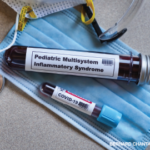With this background in mind, Dr. van de Veerdonk discussed clinical trials of lanadelumab, a human monoclonal antibody that targets plasma kallikrein, and icatibant, a selective bradykinin b2 receptor antagonist. Theoretically, both of these medications should disrupt the kallikrein-kinin system and lead to decreased bradykinin products, less pulmonary vascular leakage and, thus, less pulmonary edema. However, in summarizing studies to date, it appears icatibant was much more effective in this regard than lanadelumab.
More work is needed to understand the ways in which the kallikrein-kinin system may be targeted for treatment of COVID-19, particularly early in the course of disease, and how such blockade can be coupled with other immunomodulatory drugs to help patients.
Immune Profiling
For the session’s penultimate talk, Edward Behrens, MD, chief of the Division of Rheumatology at the Children’s Hospital of Philadelphia, spoke on the subject of immune profiling in COVID-19 and SARS-CoV-2 infections. Dr. Behrens highlighted three main articles related to this topic.
In the first article, Kuri-Cervantes et al. comprehensively mapped immune system perturbations in COVID-19 and found the neutrophil to lymphocyte ratio appears to be a prognostic biomarker of disease severity and organ failure.16
In the second article, Mathews et al. used deep immune profiling in hospitalized COVID-19 patients to identify three immunotypes associated with poor clinical trajectories vs. improving health.17
In the final article discussed, Wang et al. identified a diverse set of functional autoantibodies associated with varying impacts on immune functionality and different clinical outcomes in patients with COVID-19.18
Genetic Risks
In the session’s final talk, Helen Su, MD, PhD, chief, Human Immunological Diseases Section, NIAID, NIH, discussed the immunology of COVID-19 genetic risk factors. This talk complemented the presentation by Dr. Holland, particularly with respect to the discussion of genes that participate in type-1 interferon signaling for antiviral immunity. When mutated, these genes can cause monogenic susceptibility to COVID-19 with variable penetrance. Such genes include those that sense viral RNAs to initiate production of type-1 interferon, such as TLR3 and TLR7. Like Dr. Holland, Dr. Su explained that understanding the molecular pathogenesis of COVID-19 helps provide a strong rationale for targeted therapeutic strategies.
From start to finish, the session was remarkable in its breadth and highly impactful in terms of insights into the most important pandemic of this generation.
Jason Liebowitz, MD, completed his fellowship in rheumatology at Johns Hopkins University, Baltimore, where he also earned his medical degree. He is currently in practice with Skylands Medical Group, N.J.



